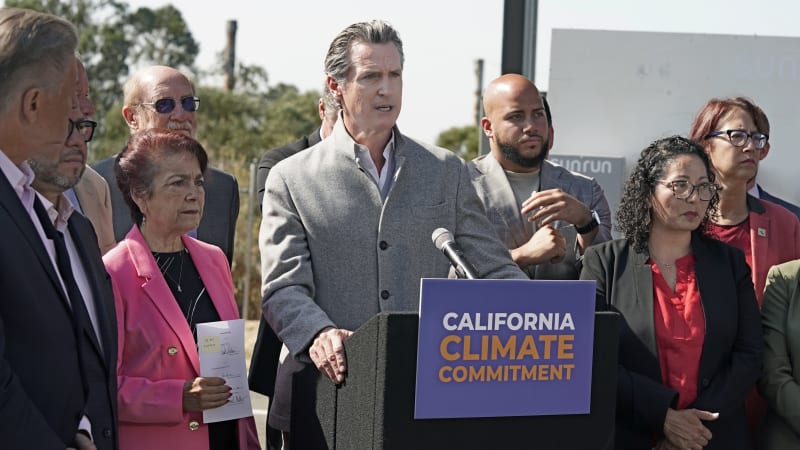California voters weigh new tax on rich to boost electric cars

California Gov. Gavin Newsom discusses Proposition 30, a tax measure on wealthy residents. Newsom is opposed to the measure that has divided Democrats. (Getty Images)
SACRAMENTO, Calif. — Should California’s richest residents pay higher taxes to help put more electric vehicles on the road? That’s a question the state’s voters are weighing in the election that concludes Tuesday.
Proposition 30 would place a new 1.75% tax on incomes above $2 million, which is estimated to be fewer than 43,000 taxpayers. It would raise billions annually, with most going to help subsidize the purchase of electric vehicles and construction of charging stations. Twenty percent of the money would go toward boosting resources to fight wildfires.
The ballot fight comes as California races to reduce emissions from transportation — by far the largest source — and meet its ambitious climate goals. Wildfires, meanwhile, are spewing more carbon into the air as they become larger and more destructive, threatening to set back the state’s progress.
Though Democratic Gov. Gavin Newsom pushed for a policy that bans the sale of most new gas-powered cars in the state in 2035, he does not support Proposition 30. That’s pit him against the state Democratic Party and a number of environmental and public health organizations.
Newsom has called it a taxpayer-funded giveaway to rideshare companies, which under California regulations must ensure nearly all trips booked through their services are zero-emission by 2030. Lyft supplied most of the “yes” campaign’s funding; competitor Uber has not taken a position.
Backers of the measure, including most major environmental groups, say the state needs a dedicated, robust source of funding to set up infrastructure that can handle more plug-in cars and to help Californians of all income levels to buy them. The money won’t go exclusively to passenger cars; the state could also tap it to put cleaner delivery trucks, buses and even e-bikes on the roads. A portion of the money must go to help people in low-income or disadvantaged communities buy or access electric cars.
Parts of Southern California and the Central Valley have some of the worst air quality in the country. Cleaning up pollution from cars, diesel trucks and public transit is essential to help the state meet its climate goals and protect public health, said Eli Lipmen, executive director for Move LA, one of the organization’s behind the measure.
The measure provides an opportunity “to ensure that Californians who deserve the best air quality in the country actually get that,” he said.
This year, about 18% of new car sales have been for fully electric or hybrid cars, according to Newsom’s office. That will have to double by 2026 to meet new state mandates for car sales. Newsom has dedicated $10 billion over six years for various electric transportation programs, and the Biden administration has set aside $5 billion over five years to build a network of highway charging stations in every state.
Rideshare companies like Lyft do not own the vehicles their drivers use, but they are still on the hook to ensure that trips booked through their app will be zero-emission. Proposition 30 does not include any provisions that exclusively benefit Lyft. But Newsom and other opponents say the measure would allow Lyft to rely on taxpayer dollars, not company money, to help its drivers transition to electric cars.
“Put simply, Prop 30 is a Trojan Horse that puts corporate welfare above the fiscal welfare of our entire state,” Newsom says in a television ad against the measure.
Supporters of the measure, though, say an effort to raise taxes on the rich to boost electric vehicle adoption was in the works before Lyft got involved.
Other opponents included the California Chamber of Commerce and the California Teachers Association. Logging companies and numerous wealthy individuals also contributed money to the “no” campaign.
It’s not the first time California voters have been asked to raise taxes on millionaires to pay for special programs. In 2004, they approved a ballot measure that raised taxes by 1% on incomes above $1 million to fund mental health services.
___
Follow AP’s coverage of the elections at: https://apnews.com/hub/2022-midterm-elections
Check out https://apnews.com/hub/explaining-the-elections to learn more about the issues and factors at play in the 2022 midterm elections.



